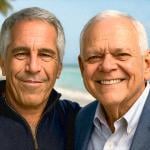Stephen Moore of the Club for Greed weighs in on President Bush's second-term "ownership society" agenda:
"By doing these things in little bitty steps at a time, it's sort of like a slippery slope, but in the right direction."
The right direction for people like Moore means taxing wages, but not wealth. It means cutting the funding for frivolities like public education, Social Security, Medicare, veterans benefits and homeland security. It means Two Americas as deliberate policy. And the America that Moore gets to live in is invitation only.
Wage-earning riff-raff are not invited.
Moore's comment is quoted in an L.A. Times article by Warren Vieth (reg. req.), bearing the unhelpful headline "Bush Yet to Flesh Out Domestic Agenda." The subhead tells the real story: "Many likely small steps in taxes and savings would add up to 'radical change,' analysts say."
With only a week to go before the Republican National Convention, the lack of details in President Bush's second-term domestic policy agenda has left some conservative activists worrying aloud about the Vision Thing.
But analysts from both parties make the case that although the individual pieces of Bush's emerging agenda may not appear that weighty or new, they still add up to something big.
Bundled within overlapping themes of tax reform and economic "ownership," they say, are initiatives that would, if enacted, move the country toward fundamentally different systems of taxation and social insurance.
After citing Stephen Moore, Vieth also quotes Peter Orszag of the Brookings Institution:
"What they're trying to do is a radical transformation of the tax code … They're trying to do it in little pieces rather than all at once. The sum of all those pieces would be a radical change."
Something big. Radical change. Radical transformation. Fundamentally different. Slippery slope. Got all that?
Yet despite the sweeping effects of all this, President Bush has been rather vague about the details. This is a president who doesn't like to burden the public with too much information about his plans for massive changes in the fabric of our society.
If you want a sense of what many of the "little bitty steps" will look like, consider the archetypal "ownership society" program: the Free Humvee for Rich People Tax Credit.
No, really. If you're wealthy enough to afford one, and if you own your own business, you can buy yourself a shiny new suburban assault vehicle and eventually write off nearly all of the cost on your taxes.
The basic attributes of the FHRPTC are true of most of the other little pieces that add up to Bush's ownership society:
1. It's pay-to-play, only benefitting those who have the thousands of dollars in surplus disposable income that serves as the entry fee to take advantage of it.
2. Wage-earners shoulder all of the cost without having a chance at the benefit.
Vieth pieces together a list of some of the probable ingredients to the "ownership society" agenda, based on what he's gleaned from "analysts and advisors, including some who have been conferring with the administration." That list includes:
• [Extending] first-term tax cuts … instead of letting them expire at various points over the next seven years. The cuts include lower income-tax rates, expanded breaks for married couples and families, reduced taxes on dividends and capital gains, bigger corporate tax deductions and a phased-out inheritance tax. Cost: about $1 trillion over 10 years.
• Allowing workers to divert a portion of their Social Security payroll taxes to new individual retirement accounts over which they control the choice of investments. Like 401(k) plans, their future value would depend on market performance, not government guarantees. Cost: $1 trillion over 10 years to maintain promised benefits.
• Scaling back the alternative minimum tax, which was instituted to ensure that wealthy filers wouldn't be able to shelter all of their income from taxes, but has begun to bite at the middle class because of income inflation. Cost: perhaps $500 billion over 10 years.
• Creating new vehicles — including lifetime savings accounts and retirement savings accounts — for reducing future taxes on savings and investment. Cost: minimal over the first 10 years, but increasingly large as future earnings are withdrawn.
• Expanding health-savings accounts, which allow Americans to accumulate money tax-free for future medical expenses, and creating similar homeownership tax breaks, such as credits for first-time buyers. Cost: uncertain.
With the exception of the already existing first-time homebuyer credits, these are all pay-to-play. They're like the old joke about the banker who says, "I can only approve the loan if you don't really need the money." The ownership society is explicitly and unapologetically an agenda to help the rich get richer.
Somebody in the Bush campaign has latched onto the word "ownership" because it taps into an ideal that is essential to the American dream. Most of us want, some day, to own our own home and to own at least a stake, if not a share, of our own livelihood.
The Bush campaign realizes this. Like the Assyrian messenger in the Book of Isaiah, they bait their trap with the promise of ownership: "This is what the king of Assyria says: Make peace with me and come out to me. Then every one of you will eat from his own vine and fig tree and drink water from his own cistern …"
That sounds like a wonderful vision of ownership. Except for the part where the king of Assyria also captured all the cities in Judah and declared himself their owner and the owner of all the people who lived there. So, you see, "ownership" can mean different things to different people.
Bush's American-dream rhetoric of ownership contrasts sharply with the idea of ownership promoted by his agenda. That agenda is not so much about promoting ownership as it is about rewarding owners.
The contrast is illustrated, again, by the great American archetypes in Frank Capra's It's a Wonderful Life.
Bush's "ownership society" has nothing to do with the egalitarian dream that the Bailey Bros. Building & Loan represents. ("Look at it today. Dozens of the prettiest little homes you ever saw. 90 percent owned by suckers who used to pay rent to you. …")
It is the ownership, instead, of Old Man Potter — the majority shareholder who lays off workers to boost his stock price, the landlord to whom the entire town pays rent.
"We've had an income tax in the United States for the past 90 years," Orszag said. "Regardless of whether your income comes from wages or investments, it is subject to tax …"
The administration's goal is to create a system in which only wage income is taxed, he said. The benefits include potentially higher rates of savings and investment. But the tax code would become more regressive, taking a larger percentage of income from low-income groups, because recipients of inherited wealth would get a free ride.
The problem with the supposed benefit there — "higher rates of savings and investment" — is that it will only be true for those who can afford it. And thanks to the "radical transformation" of the tax structure, wage-earners (i.e., anybody who actually needs their paycheck) will be less able to save or invest.
Former Labor Secretary Robert Reich, sums up the problem:
"Ownership implies the middle class has some savings with which they can own something. … The stark economic reality is: America's middle class has no savings."












